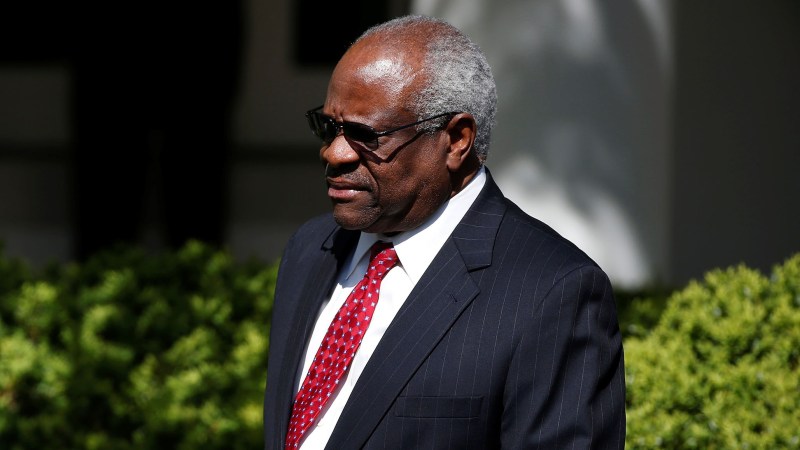
The Supreme Court’s decisions on what cases to take are often nearly as consequential as how it decides the cases it hears. The mere fact of the Court’s attention or inattention to an area of law shapes how seriously its pronouncements are taken by the lower courts and Congress, and declining to hear a case can mean it won’t take it up until the personnel on the Court has changed. With that in mind, Justice Thomas today dissented from the Court’s denial of certiorari in Rogers v. Grewal, a Second Amendment case, and Baxter v. Bracey, a case on the hot topic of qualified immunity.
In Rogers, joined by Justice Kavanaugh, Justice Thomas warned yet again that the lower courts have been engaged in judicial resistance of the Court’s precedents on gun rights, in ways that the Court would not tolerate in another area of law:
[I]n several jurisdictions throughout the country, law-abiding citizens have been barred from exercising the fundamental right to bear arms because they cannot show that they have a “justifiable need” or “good reason” for doing so. One would think that such an onerous burden on a fundamental right would warrant this Court’s review. This Court would almost certainly review the constitutionality of a law requiring citizens to establish a justifiable need before exercising their free speech rights. And it seems highly unlikely that the Court would allow a State to enforce a law requiring a woman to provide a justifiable need before seeking an abortion. But today, faced with a petition challenging just such a restriction on citizens’ Second Amendment rights, the Court simply looks the other way…Petitioner asks this Court to grant certiorari to determine whether New Jersey’s near-total prohibition on carrying a firearm in public violates his Second Amendment right to bear arms…This case gives us the opportunity to provide guidance on the proper approach for evaluating Second Amendment claims; acknowledge that the Second Amendment protects the right to carry in public; and resolve a square Circuit split on the constitutionality of justifiable need restrictions on that right. I would grant the petition for a writ of certiorari.
…[In Heller v. DC,] we explicitly rejected the invitation to evaluate Second Amendment challenges under an “interest-balancing inquiry, with the interests protected by the Second Amendment on one side and the governmental public-safety concerns on the other.” Id., at 689 (BREYER, J., dissenting). But the application of the test adopted by the courts of appeals has devolved into just that. In fact, at least one scholar has contended that this interest-balancing approach has ultimately carried the day, as the lower courts systematically ignore the Court’s actual holding in Heller. …With what other constitutional right would this Court allow such blatant defiance of its precedent? [Emphasis added; footnotes and citations omitted.]
Justice Thomas went on to note that Rogers also presented the Court the opportunity to decide the right to carry arms in public, and discussed at some length the historical roots of that right in the seventeenth and eighteenth century and how the Fourteenth Amendment was aimed in part at Reconstruction-era Southern abuses that “violated blacks’ fundamental right to carry arms in public. . . . The importance of the right to carry arms in public during Reconstruction and thereafter cannot be overstated.”
In Baxter, Justice Thomas dissented alone in a case involving qualified immunity defenses for the police in a lawsuit by a man who was bitten by a police dog, and issued his strongest statement yet against the Court’s qualified immunity doctrine:
I have previously expressed my doubts about our qualified immunity jurisprudence. …Because our §1983 qualified immunity doctrine appears to stray from the statutory text, I would grant this petition…In several different respects, it appears that our analysis is no longer grounded in the common-law backdrop against which Congress enacted the 1871 Act…There likely is no basis for the objective inquiry into clearly established law that our modern cases prescribe. Leading treatises from the second half of the 19th century and case law until the 1980s contain no support for this “clearly established law” test. Indeed, the Court adopted the test not because of general principles of tort immunities and defenses, but because of a “balancing of competing values” about litigation costs and efficiency…There also may be no justification for a one-size-fits-all, subjective immunity based on good faith. Nineteenth century officials sometimes avoided liability because they exercised their discretion in good faith. [Emphasis added; quotations and citations omitted.]
His opinion cited recent scholarship on whether qualified immunity was within the original meaning of §1983, enacted in 1871. However, Justice Thomas also signaled his interest in whether the Court correctly decided Monroe v. Pape, the 1961 case that authorized suits against police for acting “under color of law . . . even when state law did not authorize his action.” He noted that he was not opining on defenses in Bivens cases, where liability for constitutional violations by federal officials does not arise from a statute but was created out of whole cloth by the Court itself.
Congress may soon take up the qualified immunity question, which would be a good reason for the Court to duck the question for now, but then again, Tim Scott said yesterday that qualified immunity repeal would be a “poison pill” that Republican Senators couldn’t vote for. So, waiting may not accomplish much. In either event, Justice Thomas’ long argument against wrong turns taken in the law — some long ago, some in continued resistance to constitutional text — continues.


